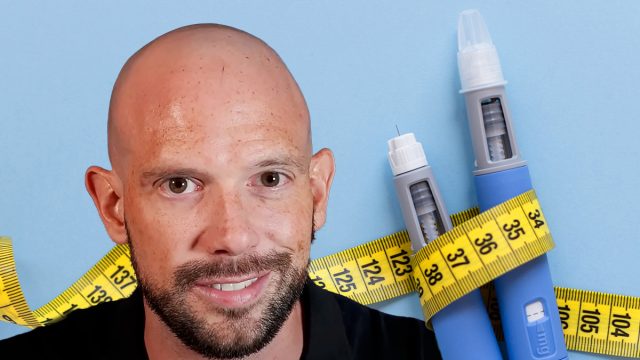Pharmacist Reveals 5 Game-Breaking Tips for Losing Weight Faster with GLP-1 Meds
If you're taking Wegovy or Ozempic but not seeing the results you want, these expert tips could be the game-changer you need. "If losing weight was just about finding the perfect diet plan or exercise routine, well, you wouldn't be here," says Dr. Dan, a pharmacist and obesity management expert. Through his popular YouTube channel, he's helped thousands optimize their GLP-1 medication results by combining medical expertise with practical lifestyle strategies. Read on to discover how to make your medication work harder for lasting weight loss success.
Understanding GLP-1 Medications
Let's start with some information about GLP-1 medications like Ozempic and Wegovy. Dr. Sue Decotiis, MD, a weight-loss doctor in NYC, explains, "They enhance the release and action of insulin throughout the body, which helps with fat loss." These medications work in multiple ways: they suppress appetite through receptors in the gut and brain, reset your body's fat-holding rate, and improve insulin function. Dr. Decotiis notes, "When insulin works well, you can burn fat; when it doesn't, you gain weight." Additionally, these medications help regulate hormones that may have changed due to aging or stress.
Your Primal Brain and The Weight Loss Challenge
"We are dealing with an inconsolable child that is your irrational, emotional, and hedonistic primal brain," Dr. Dan reveals. "It fundamentally doesn't want you to lose weight. It doesn't want you to cut out the sweet, and it really doesn't want you to become more active." While medications can help "cage or put up a fence for our primal brain," maintaining good lifestyle practices is crucial to prevent weight regain.
Prioritize Protein to Preserve Muscle Mass
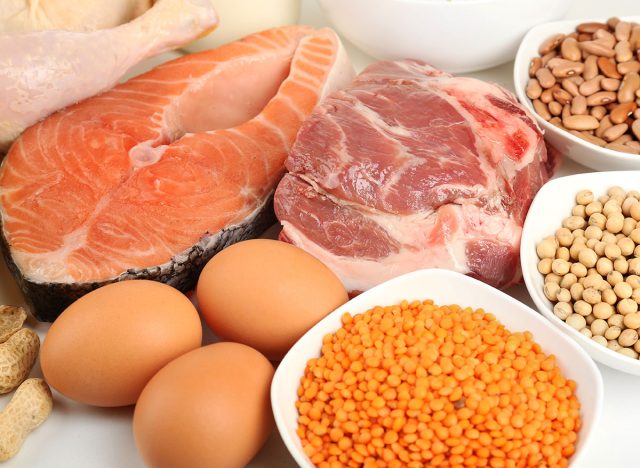
"Protein is absolutely essential for everybody, but particularly for individuals on GLP-1 medications," says Dr. Dan. He emphasizes aiming for 30 grams of protein at meals and 20 grams at snacks. "Not only does protein help to keep us fuller for longer so we consume less food, but if your body needs carbs or fats, it can take protein and convert it into those two macronutrients." Start early in the day and increase intake gradually. Consider both animal proteins (chicken, beef, eggs) and plant-based options (tofu, lentils).
RELATED: 20 Possible Ozempic Side Effects
Create Consistent Meal Times to Manage Hunger
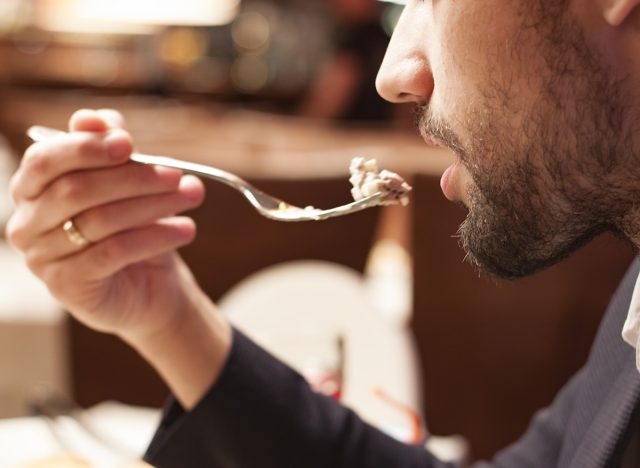
"You see, 30,000 years ago, when we were living in caves, we didn't have any predictability in our lives," Dr. Dan explains. "Our primal brain is used to being in that world. But really what it wants is that predictability." By establishing regular meal times, you can better manage hunger and avoid making poor food choices when "hangry." The key is creating a routine your body can rely on. "Aim for being predictable and boring," he advises.
Don't Cut Calories Too Low
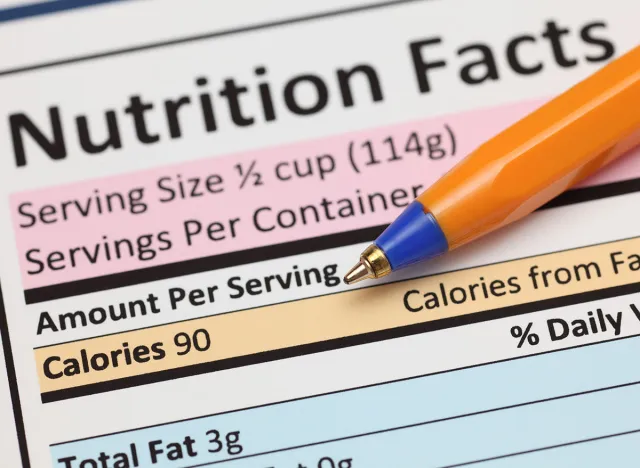
"When you drastically cut your calories, you really piss your primal brain off," Dr. Dan warns. He describes the familiar cycle: "Spending an entire week on a diet starving themselves, white-knuckling it until Friday, and then Friday comes, and we start to ease up." This pattern leads to weekend binges and Monday restarts. Instead of aiming for 1,200 calories, which he says "is already too low," calculate your appropriate intake for sustainable weight loss.
Focus on Fiber for Fullness and Health

"Fiber is really the unsung hero," Dr. Dan shares. "Not only can it keep us fuller for longer, which when paired with the GLP-1 medications is a great little tool, but fiber through fruits and veggies provide us with a lot of micronutrients." He recommends at least 25 grams daily through foods and supplements like Metamucil. "Plus, fiber can help you manage any side effects from a GI perspective that you might experience with the GLP-1s."
Make Exercise Work for You

"Exercise is pretty hard to go wrong with," Dr. Dan notes, but many people overcomplicate it. "People tend to get caught up in the all or nothing in that if I can't do something for at least an hour, there's no point in doing it." He particularly advocates for resistance training: "It allows you to have a way to quickly see results beyond what the scale might be telling you." Start small with hand weights during walks or basic strength exercises. "You're not going to magically turn into a bodybuilder overnight. What's going to happen is you're going to get stronger, you're going to feel better, and you're going to feel more confident."
RELATED: What Happens to Your Body When You Stop Taking Ozempic
The Power of Consistency

"Consistency might be the most important factor because, without consistency, everything else that I've already talked about is pretty much useless," Dr. Dan emphasizes. He compares it to investing: "We're doing a small action every single day consistently until it builds and builds and builds and eventually compounds to give us our big fat outcome." Don't overcomplicate your routine; focus on showing up every day. "The more consistent that you are, the faster the results are going to be."
The Science of Satiety and Success
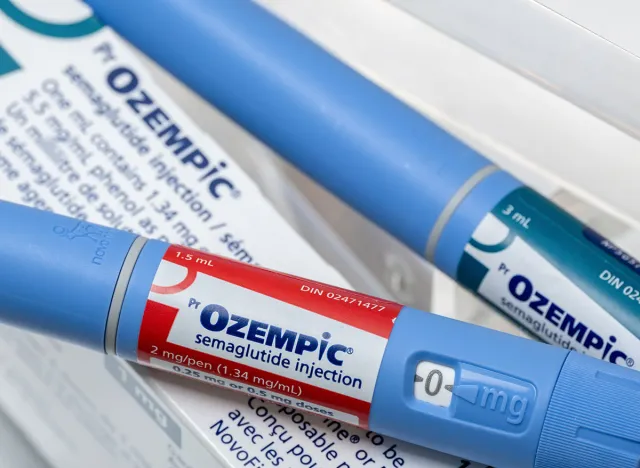
Understanding how these medications affect your appetite can help you optimize their benefits. "Weight loss drugs have a tremendous effect on satiety, shutting down appetite so the patient feels full after eating much less food," Dr. Decotiis explains. This biological change makes it easier to follow Dr. Dan's recommendations for consistent meal timing and appropriate calorie intake. However, it's important to note that these changes may be temporary without proper habits in place. Research shows that after discontinuing medication, many people regain significant weight – one study found participants regained two-thirds of their weight loss within a year of stopping the medication.
Mental and Physical Benefits

The journey with GLP-1 medications often brings benefits beyond weight loss. "When people lose weight, they have better self-esteem, and they feel more confident in their own skin," Dr. Decotiis shares. Some patients experience improved focus and reduced anxiety. These positive changes, combined with the physical improvements from following Dr. Dan's exercise and nutrition recommendations, create a comprehensive approach to better health.
RELATED: 20 Things to Avoid While on Ozempic
Making the Most of Your Medication

For optimal results, medical guidelines recommend using GLP-1 medications "along with an individualized low-calorie, low-fat diet and exercise program." By following Dr. Dan's strategies while maintaining consistent medication use, you're setting yourself up for the best possible outcomes. Remember, these medications are powerful tools, but they work best when combined with sustainable lifestyle changes that you can maintain long-term. And if you enjoyed this article, don't miss 20 Incredible Ozempic Success Stories of All Time.
